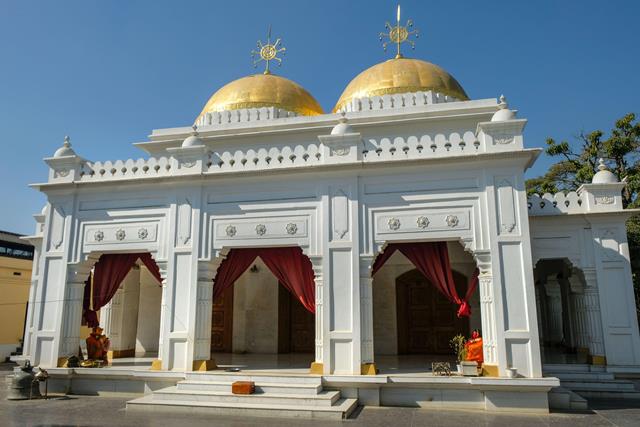 Shree Govindaji Temple is a Vaishnava temple, located next to the palace of the former rulers of the then Manipur Kingdom in Imphal, India. [photo: Oscar Espinosa / Alamy]
Shree Govindaji Temple is a Vaishnava temple, located next to the palace of the former rulers of the then Manipur Kingdom in Imphal, India. [photo: Oscar Espinosa / Alamy]
[This is an excerpt from an article in The Round Table: The Commonwealth Journal of International Affairs.]
In May 2023, a violent spate of events related to ethnic violence and conflict began in Manipur, a state in the northeastern region of India, between two major communities, namely the Meitei, who live mostly in the Imphal Valley, and the Kuki, who predominantly live in the Hill area. The enlargement of the conflict and related complexities of the issue is a cause for major concern in national security terms as well as in the context of India’s delicate social fabric. It calls for an examination of the historical background which has to do with India’s colonial legacy.
The Kingdom of Manipur, known as Sana Leibak (translated as the Land of Gold),Footnote1 had diplomatic and political alliances with the British which can be traced back to as far back as 1762. In the aftermath of a devastating incursion carried out by Alompra, founder of Burma’s Konbaung dynasty (1752–1885), the Kingdom was in decline until an alliance with the British brought it back to the fore of geopolitical transitions which arose during both the colonial era. About five decades later, in 1823, the alliance cemented greatly due to this particular threat from the Burmese Kingdom. A treaty of ‘alliance, offensive and defensive’ was negotiated in September 1762 between Verelst (the British representative) and Hari Das Gosain (representative of the Kingdom of Manipur).
Anglo-Manipur relations began to fructify in the aftermath of the Anglo-Burmese War (1824–26), which saw an alliance between the British and the Kingdom of Manipur, followed by the recognition of Gambhir Singh as the ruler under the Treaty of Yandaboo (in 1826) and the Treaty of Jiri (in 1833), which lasted for the next five to six decades. Thus, at least until 1885, the British utilised the Kingdom of Manipur as a buffer state against the Konbaung, and also against any French advancements, thus protecting the British-controlled territories in the Indian subcontinent, which included the modern-day state of Assam and Bangladesh. However, as regards administrative control, the British established an office of Political Agent in Manipur in 1835, which gave them significant influence and control over the state’s affairs.
Monuments, Power and Poverty in India: From Ashoka to the Raj
Peace, poverty and betrayal: A new history of British India
The Third Anglo-Burmese War (1885) effectively ended the threat of Burmese invasion as well as the role of the Kingdom of Manipur as a buffer state. The thawing of relations between the British and the French, under which collaborative efforts in wars against the Chinese (Qing Empire) during the Opium Wars in the 19th century, the recognition of each other’s sphere of influence during the 1880s, and a consolidation of the Indochina region by the French in the aftermath of the Sino-French War (1884–85) saw a ‘transformative’ change of British policy towards the Kingdom of Manipur. Resultantly, the Kingdom of Manipur lost its importance to the British which, coupled with the deteriorating internal relations between Sur Chandra Singh, the King of Manipur and the British political agent, led, in 1891, to British efforts to have Kula Chandra Dhaja, younger brother of the abdicated king, to rule the kingdom. However, in a retaliation to the British interference, five British officials, were killed in 1891, aggravating the conflict into a full-scale war, followed the invasion of the Kingdom of Manipur by the British.
The impact and influence of British rule included the opening up of trade relations for Manipur in British-held ports in the Indian Ocean region as well as those in the Far East region. Furthermore, the establishment of a British military cantonment at Imphal in 1892, to prevent uprisings in the future as well as a residence for political agents led to the development of modern urban spaces in the region. However, the policy of Hill-Valley Divide that entailed segregation of the hills from the plains had a profound impact on the social and political developments, which were to have huge ramifications for the future of region.
Ramnath Reghunadhan and Loung Nathan K.K. are with the Department of International Studies, Political Science and History, Christ University, Bangalore, India.



